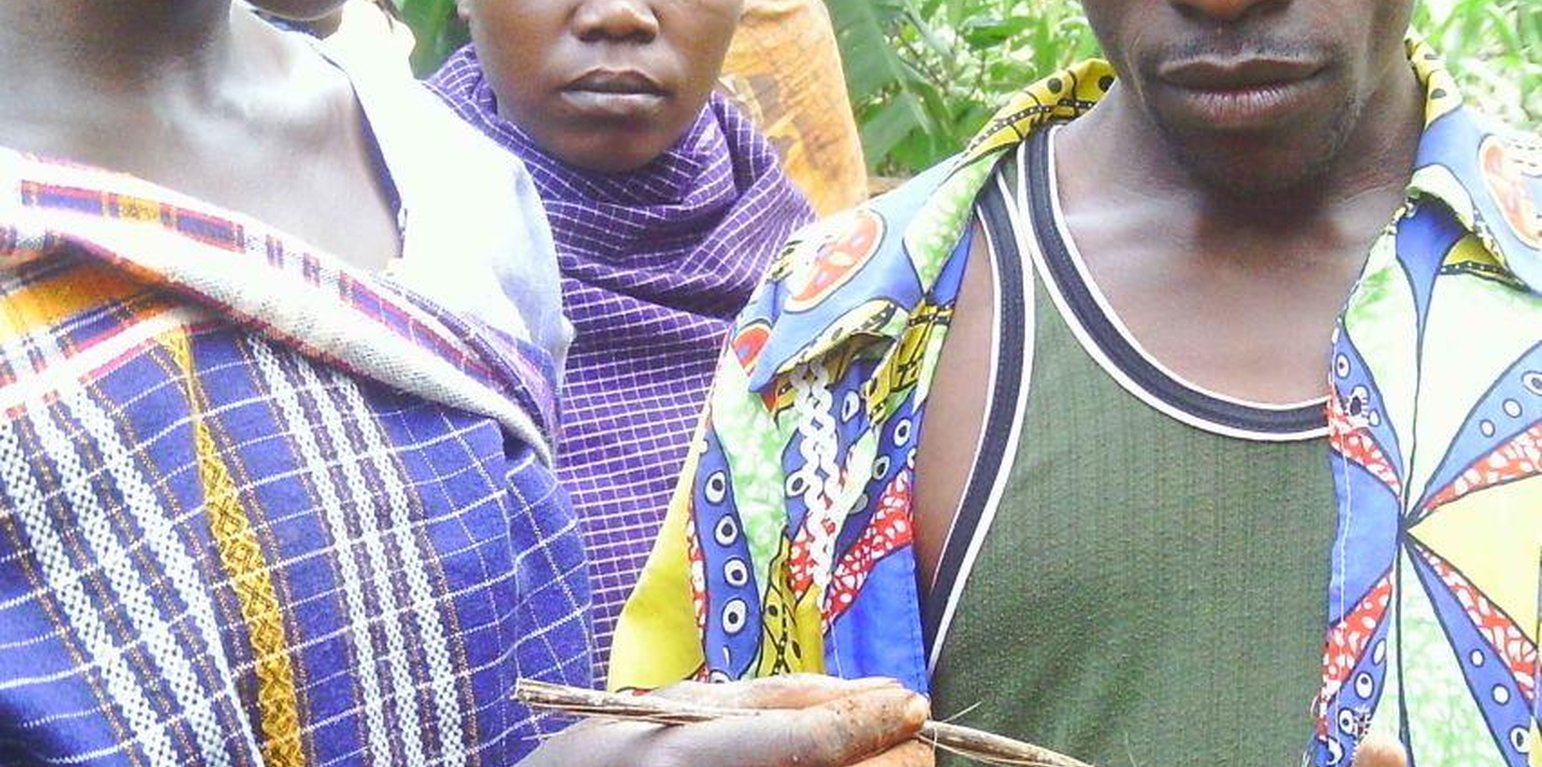Community intergrated catchment ecosystem management
(Tanzania, República Unida de)
Mfumo wa usimamizi wa ekolojia katika eneo bonde (Swahili)
Descripción
Adaptive Agro-ecosystem Micro-catchment Approach.
Aims / objectives: SLM knowledge skill generation and capacity building. Improved group and community strength, sustainability, organization and their capacity to benefit and invest in SLM. Motivation of community participation in SLM through use of quick win project, income generating activities, rural micro finance institutions, marketing and active engagement of disadvantaged groups.
Methods: Wider promotion of basket of choice of SLM technologies through SLM Farmer Field School, Demonstration plots and community related activities. Make use and build on already existing and new groups, existing institutions and the community as a whole. Strategic use of easily available and accessible available community institutions/ infrastructures (school and dispensaries sites) to demonstrate and promote basket of choice of SLM technologies. Learning by doing on the job, practical training, adoption and adaptation to local reality.
Stages of implementation: Site characterization through land degradation analysis (LADA) and development of community site specific SLM plan exemplifying SLM interventions needed to address the identified degradation types. Set up and identification of approaches needed to execute identified interventions complementary approaches. Sensitization and awareness creation to the community and actual execution of approaches.
Role of stakeholders: Individual groups: are core implementers and potential beneficiaries of the project.
Extension worker: Advisory and technical backstopping.
Elected and employed leaders at the sub-village, village and ward level: bylaw/law enforcement, supervisory and land provision.
Relief for Development Societies NGO (REDESO): Service provision and development partner in SLM.
Trans boundary Agro-ecosystem Management Project (TAMP): Provision of supportive resources (financial and technical).
Ngara district council: Supervisory, technical, policy interpretation, monitoring and evaluation, documentation, analysis and shairing .
Rugenge/Kirusha Micro catchment Committee: Supervisory, advisory and law enforcement.
Lugar
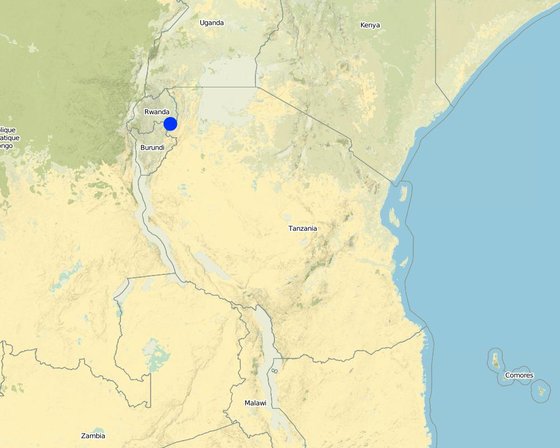
Lugar: Ngara, Tanzania, Tanzania, República Unida de
Georreferencia de sitios seleccionados
Dato de inicio: 2010
Año de conclusión: 2014
Tipo de Enfoque
-
tradicional/ local
-
iniciativa local reciente/ innovadora
-
proyecto/ basado en un programa
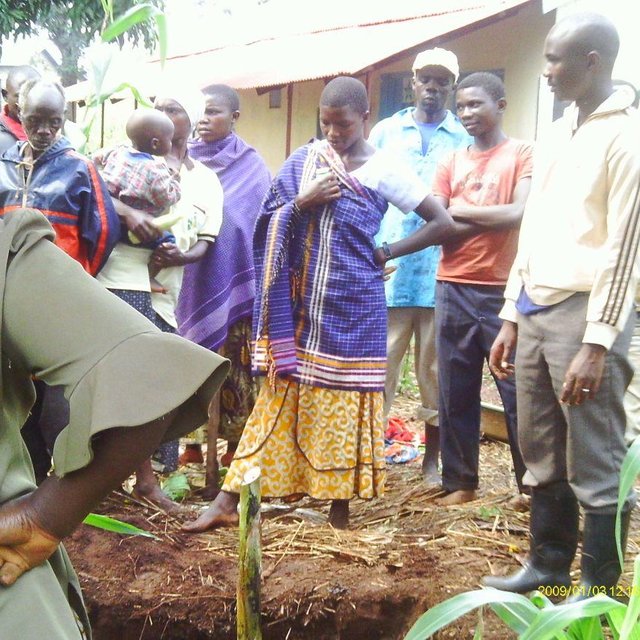
Farmer Field School in training (Iddiphonce Mwasikundima (box 30 Ngara Kagera Tanzania))
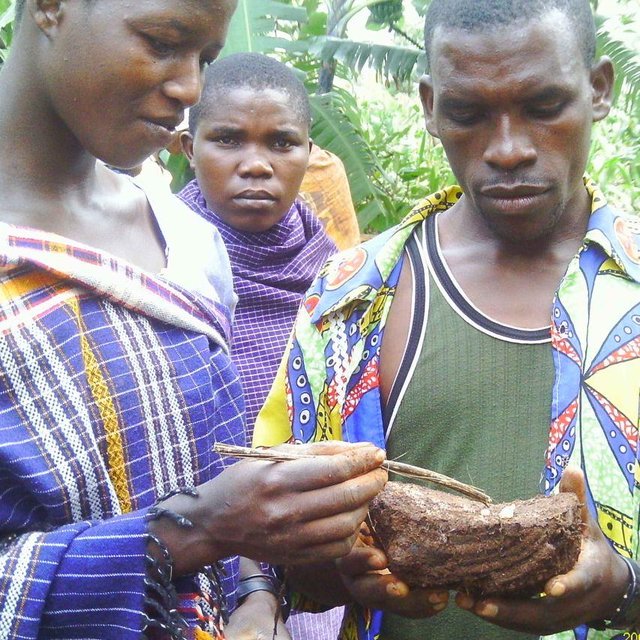
Farmers observing pests in banana during agro ecosystem analysis (AESA) (Iddiphonce Mwasikundima (box 30 Ngara Kagera Tanzania))
Metas del Enfoque y entorno facilitador
Propósitos/ objetivos principales del Enfoque
The Approach focused mainly on SLM with other activities (Motivating quick win income generation activities, rural microfinance institutions, marketing and HIV/AIDS controll.)
Knowledge/skill generation, demonstration and sustainability of SLM activities.
Motivate active participation of the community.
Inculcate a sense of community ownership/ community take charge of SLM activities.
The SLM Approach addressed the following problems: Lack of technical knowledge
Low investment capacity
Malpractice and mismanagement of local resources (e.g. fire burning, ploughing along the slope).
Adequate supervision, monitoring and law enforcement.
Condiciones que facilitan la implementación de la/s Tecnología/s aplicadas bajo el Enfoque
-
Marco de trabajo legal (tenencia de tierra, derechos de uso de tierra y agua): The existing land ownership, land use rights / water rights helped a little the approach implementation: Hindrance is usually observant for approaches which need long term commitment of land resources (e.g perennial crops) but is minimal for short term (annuals and biannual).
Open access land resources are difficult to manage.
Condiciones que impiden la implementación de la/s Tecnología/s aplicadas bajo el Enfoque
-
Normas y valores sociales/ culturales/ religiosos: Negative cultural believes that fire burning can lead to one living long or reach older age.
Treatment through the SLM Approach: Change of mind set through FFS training, demos and community sensitization.
-
Disponibilidad/ acceso a recursos y servicios financieros : Low investment capacity and inability to access supportive resources
Treatment through the SLM Approach: Easy access to TAMP supportive resources.
-
Entorno institucional: Narrow coverage of the district, local institutions not involved in in SLM.
Treatment through the SLM Approach: Higher coverage, ope-rationalization of SLM in LGA system.
-
Marco de trabajo legal (tenencia de tierra, derechos de uso de tierra y agua): Reluctance of the village to issue land, less protection of open access land resources.
Treatment through the SLM Approach: land issuing for FFS/Demo use legally recognized through signing of Memorandum Of Understanding (MOU) between the village and land users/SLM groups. Bylaws reinforcement to protect mismanagement of open access land resources.
-
Conocimiento de MST, acceso a apoyo técnico: Inadequate understanding and use of SLM technical knowledge (both scientific and indigenous) to address land degradation problems.
Treatment through the SLM Approach: Up scaling use of scientific SLM knowledge.
Documentation, evaluation, analysis and sharing of successful indigenous SLM technical knowledge.
-
Carga de trabajo, disponibilidad de mano de obra: High workload to extension officers (due to their shortage).
Treatment through the SLM Approach: Build a local resource base in facilitating SLM activities through introduction of community SLM facilitators and Micro-catchment committee.
-
Otros: Low motivation due to long term realization of SLM benefits.
Treatment through the SLM Approach: introduce SLM related quick win projects and income generation activities (IGA).
Participación y roles de las partes interesadas involucradas
Partes interesadas involucradas en el Enfoque y sus roles
| ¿Qué partes interesadas/ entidades implementadoras estuvieron involucradas en el Enfoque? |
Especifique las partes interesadas |
Describa los roles de las partes interesadas |
| usuarios locales de tierras/ comunidades locales |
Core implementors. all gender, youth and elders . Widows, Orphans, People living with HIV/AIDS were actively indiscriminately involved in FFS, Demos and community related activities.. |
|
| especialistas MST/consejeros agrícolas |
all gender, youth and elders |
|
| profesores/ niños en edad escolar/ estudiantes |
all gender, youth and elders |
|
| ONG |
|
dvisory, technical back stopping, supervisory and monitoring. |
| gobierno local |
|
Advisory, technical back stopping, supervisory and monitoring. |
| gobierno nacional (planificadores, autoridades) |
|
dvisory, technical back stopping, supervisory and monitoring. |
| organización internacional |
|
dvisory, supervisory and monitoring. |
Agencia líder
Land user (all genders, youth and elders): consulted and made informed decision about the approach to be used. National specialists: potential facilitators in designing and community sensitization. International specialists: consultative and subject matter specialist (e.g. FFS specialist)
Involucramiento de los usuarios locales de tierras/ comunidades locales en las distintas fases del Enfoque
ninguno
pasivo
apoyo externo
interactivo
auto-movilización
iniciación/ motivación
Community, groups, employed and elected leaders: participated in sensitization and awareness creation process.
planificación
Community, groups, employed and elected leaders: active participants and decision makers in planning e.g. selection of FFS community facilitators and formation of micro-catchment committee.
implementación
Community, groups, employed and elected leaders: core and key implementers of the approach.
monitoreo y evaluación
Community, groups, employed and elected leaders: self mobilized and client interactive monitoring.
Research
Community, groups, employed and elected leaders: site identification and active implementers of adaptive trials (e.g use of fanya juu/chini terraces, vertivar grass e.t.c). Adopters, users and promoters of the best bets technologies.
Flujograma
organization structure of community integrated catchment ecosystem management.
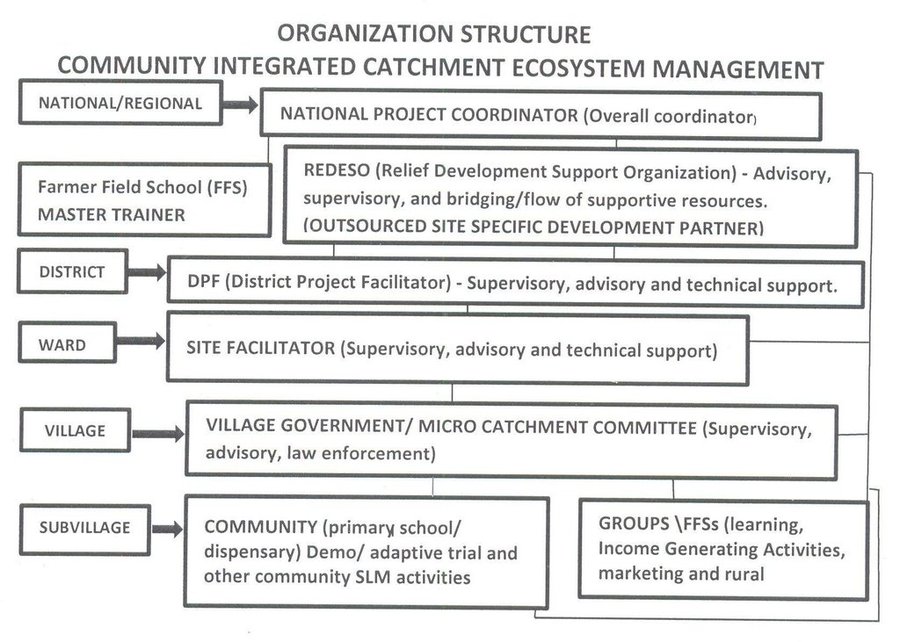
Autor: Allan Isaka Bubelwa (Box 38 Kyaka Missenyi Kagera Tanzania)
La toma de decisiones en la selección de Tecnología MST
Las decisiones fueron tomadas por
-
solamente usuarios de tierras (autoiniciativa)
-
principalmente usuarios de tierras con el apoyo de especialistas MST
-
todos los actores relevantes, como parte de un enfoque participativo
-
principalmente por especialistas MST en consulta con usuarios de tierras
-
solo por especialistas MST
-
por políticos/ líderes
La toma de decisiones se basa en
-
la evaluación de conocimiento MST bien documentado (la toma de decisiones se basa en evidencia)
-
hallazgos de investigaciones
-
la experiencia personal y opiniones (no documentadas)
Apoyo técnico, fortalecimiento institucional y gestión del conocimiento
Las siguientes actividades o servicios fueron parte del enfoque
-
Construcción de capacidades / capacitación
-
Servicio de asesoría
-
Fortalecimiento institucional (desarrollo institucional)
-
Monitoreo y evaluación
-
Investigación
Construcción de capacidades/ capacitación
Se proporcionó capacitación a las siguientes partes interesadas
-
usuarios de tierras
-
personal de campo/ consejeros
-
employed and elected leaders
Forma de capacitación
-
en el contexto de trabajo
-
de agricultor a agricultor
-
áreas de demostración
-
reuniones públicas
-
cursos
Temas avanzados
SLM related subjects
Servicio de asesoría
Se proporcionó servicio de asesoría
-
en los campos de los usuarios de tierras
-
en centros permanentes
Name of method used for advisory service: Farmer field schools (FFS); Key elements: Practical training and learning by doing., Basket of choice of Technologies/Demos., Group oriented and site specific; Adoption depends on farmers choice and ability to invest.
Advisory service is inadequate to ensure the continuation of land conservation activities; There is limited knowledge and low funding capacity.
Fortalecimiento institucional
Se fortalecieron/ establecieron instituciones
-
no
-
sí, un poco
-
sí, moderadamente
-
sí, mucho
Describa la institución, los roles y las responsabilidades, miembros, etc.
Tipo de apoyo
-
financiero
-
construcción de capacidades/ entrenamiento
-
equipo
Detalles adicionales
Training provision to micro-catchment committee.
Monitoreo y evaluación
bio-physical aspects were ad hoc monitored by project staff, government, land users through observations; indicators: hactarage conserved
bio-physical aspects were ad hoc monitored by project staff, government, land users through measurements; indicators: hactarage conserved
technical aspects were regular monitored by project staff, government, land users through observations; indicators: number of adopters
technical aspects were regular monitored by project staff, government, land users through measurements; indicators: number of adopters
socio-cultural aspects were regular monitored by project staff, government, land users through observations; indicators: % involvement of women
socio-cultural aspects were regular monitored by project staff, government, land users through measurements; indicators: % involvement of women
economic / production aspects were regular monitored by project staff, government, land users through observations; indicators: % increase in yield and income
economic / production aspects were regular monitored by project staff, government, land users through measurements; indicators: % increase in yield and income
area treated aspects were regular monitored by project staff, government, land users through observations; indicators: hactarage conserved
area treated aspects were regular monitored by project staff, government, land users through measurements; indicators: hactarage conserved
no. of land users involved aspects were regular monitored by project staff, government, land users through observations; indicators: number of adopters
no. of land users involved aspects were regular monitored by project staff, government, land users through measurements; indicators: number of adopters
management of Approach aspects were regular monitored by project staff, government, land users through observations; indicators: Number of FFS, Demos and IGA
management of Approach aspects were monitored through measurements; indicators: umber of FFS, Demos and IGA
There were several changes in the Approach as a result of monitoring and evaluation: Introduction of FFS farmer facilitators and Micro-catchment committees.
There were few changes in the Technology as a result of monitoring and evaluation: In the course of implementation adjusting or modifying technologies to suit agro-ecological condition or landforms
Investigación
La investigación trató los siguientes temas
-
sociología
-
economía/ marketing
-
ecología
-
tecnología
-
adaptive SLM trials
Adaptive SLM trials run by community/district/ARI Maruku through demos where farmers can select the best bets to apply and try on their own fields.
Research was carried out on-farm
Financiamiento y apoyo material externo
Presupuesto anual en dólares americanos para el componente MST
-
< 2,000
-
2,000-10,000
-
10,000-100,000
-
100,000-1,000,000
-
> 1,000,000
Precise annual budget: n.d.
Approach costs were met by the following donors: international (TAMP): 50.0%; government (Region/ARI Maruku.): 10.0%; local government (district, county, municipality, village etc) (Ngara district council, Villages and Ward): 20.0%; local community / land user(s) (Local community and groups withi the microcatchment ): 20.0%
Los siguientes servicios o incentivos fueron proporcionados a los usuarios de las tierras
-
Apoyo financiero/material proporcionado a los usuarios de tierras
-
Subsidios para insumos específicos
-
Crédito
-
Otros incentivos o instrumentos
Apoyo financiero/material proporcionado a los usuarios de tierras
parcialmente financiado
totalmente financiado
equipo: herramientas
Working gears (gun boots, raincoats, T-shirts)
agrícola: semillas: fertilizantes
Livestock
Chicken, goats and bees
El trabajo de los usuarios de las tierras fue
-
voluntario?
-
comida por trabajo?
-
pagado en efectivo?
-
recompensado con otro tipo de apoyo material?
Análisis de impacto y comentarios de conclusión
Impactos del Enfoque
No
Sí, un poco
Sí, moderadamente
Sí, mucho
¿El Enfoque ayudó a los usuarios de tierras a implementar y mantener Tecnologías MST?
Knowledge and skill acquired through FFS, Demos and community related intervention played significant role in improvement of SLM. Bylaw reinforcement significantly prevented malpractices/land resource mismanagement.
¿El Enfoque empoderó a grupos en desventaja social y económica?
Improved to livelihood mechanism/alternates to widow, orphan and people living with HIV/AIDS
¿El Enfoque mejoró cuestiones de tenencia de tierra/ derechos de usuarios que obstaculizaron la implementación de la Tecnologías MST?
The approach involve signing of memorandum of understanding (MOU) over use of land resource between farmer groups running Demos and FFS and the village government. MOU is a strong and reliable legal acquisition of land resource to be used for conservation activities.
Did other land users / projects adopt the Approach?
On average each FFS member induced adoption to 2 household farmers.
Motivación principal del usuario de la tierra para implementar MST
-
producción incrementada
-
incremento de la renta(bilidad), proporción mejorada de costo-beneficio
-
reducción de la degradación de la tierra
-
reducción del riesgo de desastres naturales
-
carga de trabajo reducida
-
pagos/ subsidios
-
reglas y reglamentos (multas)/ aplicación
-
prestigio, presión social/ cohesión social
-
afiliación al movimiento/ proyecto/ grupo/ redes
-
conciencia medioambiental
-
costumbres y creencias, moral
-
conocimiento y capacidades mejorados de MST
-
mejoramiento estético
-
mitigación de conflicto
-
well-being and livelihoods improvement
Sostenibilidad de las actividades del Enfoque
¿Pueden los usuarios de tierras sostener lo que se implementó mediante el Enfoque (sin apoyo externo)?
Farmers have realized the benefit of SLM. The village historical track records and experience indicate that farmers in Kirusha village usually continue what ever they come to realize is implemented for their own benefit. Further more, establishment of local human resource in SLM in terms of FFS facilitators and micro-catchment committee and their ope-rationalization into LGA systems is an assure way towards sustainability.
Motivation induced through quick win income generating activities (goat production, chicken, piggery, fruit tree nurseries and apiaries) and easy to manage demo set at Kirushya primary school and dispensary (reachable and easily accessible) are added assurance for project sustainability.
Conclusiones y lecciones aprendidas
Fortalezas: perspectiva del usuario de tierras
-
Learning and acquisition of knowledge (How to sustain/ enhance this strength: continuation of FFS, Demo and community activities.)
-
Cohesiveness and self help (How to sustain/ enhance this strength: Continue promotion of VICOBA and Market. )
-
Spread of knowledge within and outside village. (How to sustain/ enhance this strength: Continue use of the approach. )
Fortalezas: punto de vista del compilador o de otra persona recurso clave
-
Improved relationship, unity, cohesiveness and common voice. (How to sustain/ enhance this strength: Continue with promotion, strengthening and establishment of IGA, SACCAS and VICOBA.)
-
More farmers are involved (rapid adoption and expansion) (How to sustain/ enhance this strength: Up scaling and strengthening of FFS, Demos, and IGA. )
-
The approach is cost effective (benefit surpass costs) (How to sustain/ enhance this strength: Promote, expand and continue use of FFS, Demos and IGA.)
-
Assured and promising elements of sustainability. (How to sustain/ enhance this strength: Strengthen ope-rationalization and use of micro-catchment committee and FFS facilitators. )
-
Easy access to supportive resources
(Land and financial) (How to sustain/ enhance this strength: strengthen and liaise FFS with service providers
(Bank, SACCOS and Marketing))
Debilidades/ desventajas/ riesgos: perspectiva del usuario de tierrascómo sobreponerse
-
Negative customs and believes
(it is believed that one can live longer and reach older age by setting fire and burning of a large area).
Discourage negative custom and believes
-
Reluctance of household heads especially in patrimonial societies.
Community sensitization to gender (gender be addressed as the basic component of the approach).
-
Failure and negative experience of past development projects and programmes.
Change of mind set
-
Shortage of inputs and working facilities
Promote availability and accessibility of inputs and working facilities.
Debilidades/ desventajas/ riesgos: punto de vista del compilador o de otra persona recurso clavecómo sobreponerse
-
Selfishness, individualism by some untrustworthy politicians and leaders.
Combine SLM promotion with civic education training.
-
Prone to natural calamities and disastrous events
Introduce and strengthen use of Agro-based insurance.
-
Largely relies on government or farmer willingness to release and offer land.
Sensitize and encourage use of MOU.
-
If not done in precaution can perpetuate dependency syndrome
Encourage use of self mobilized farmer groups and their strengthening and ope-rationalization into existing systems.
-
Reliable external supportive resource needed initially
Reliable and timely supply of supportive resources.
Referencias
Fecha de la implementación: 10 de marzo de 2014
Últimas actualización: 6 de julio de 2017
Personas de referencia
-
ALLAN BUBELWA (allan.bubelwa@gmail.com) - Especialista MST
-
Bertha Munyaga (bkmunyaga@yahoo.com) - Especialista MST
-
Philip Ileta (iletaphilip@yahoo.com) - Especialista MST
-
Idephonce Mwasikundima - Especialista MST
Descripción completa en la base de datos de WOCAT
La documentación fue facilitada por
Institución
- Bukoba district council (Bukoba district council) - Tanzania, República Unida de
- Ngara District Council (Ngara District Council) - Tanzania, República Unida de
Proyecto
Referencias claves
-
Site characterization report: Kimamba Lyoba, :
